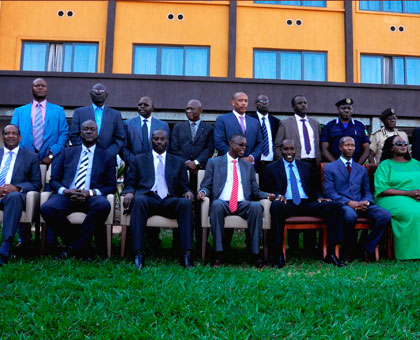Regional defence and security ministers have adopted the implementation of two security pacts aimed at uniting regional security against threats.


Regional defence and security ministers have adopted the implementation of two security pacts aimed at uniting regional security against threats.
The two pacts, signed by the Heads of State of Rwanda, Uganda and Kenya, in February this year, include mutual defence pact and mutual peace and security pacts.
The key areas of the pacts include eradicating terror in the region, collectively fighting trans-national crimes, disasters and ensuring peace and security.
Speaking at the meeting that was also attended by top defence officials from Burundi and South Sudan as observers, Rwanda’s Defence minister James Kabarebe welcomed the new development.
"We need to demonstrate to our people that they can move freely by eradicating terror organisations from our region and fight transnational crimes collectively,” Kabarebe said.
"The Northern Corridor initiatives by our respective Heads of State such as infrastructure development, free movement of people and goods and single customs are opening up unprecedented opportunities for the people of the three countries. We have, as a priority, to put in place measures to safeguard them. Security challenges in the region are there for us to solve and we shouldn’t expect any external help,” the minister added.
The next summit of the Heads of State is slated to take place in Kigali to formally implement the two pacts. The implementation framework will go hand-in-hand with parliamentary ratifications by member states.
Expediting ratification
Minister Kabarebe urged other partner states to expedite the process as only two months are left to meet the ratification deadline.
"By the next summit, Rwanda will have deposited both instruments of ratification to the partner states,” said the minister.
Rwanda’s Minister for Internal Security, Sheikh Musa Fazil Harelimana, said the cooperation was inevitable if the integration projects were to be successful.
"Today marks another step in promoting and maintaining safety of our people and their property and a signal to fast-track and safeguard the Northern Corridor Integration Projects,” Harelimana said.
The security frameworks provide for other regional member states to join the defence peace and security pacts. It is in that regard that South Sudan and Burundi joined in the cluster meetings.
Jimmy Hodari, the Commissioner for International Cooperation, said the pacts would contribute to regional development.
"The northern corridor project has fostered among others; infrastructure development, single customs territory, free movement of people and goods are opening up unprecedented opportunities for the people of the three neighbouring countries, and we have in all measure to safe guard these development projects,” Hodari said.
"Collective security is not only a deterring factor to the security threats, but it will help all of us to continuously combat security threats that are within our region.”


